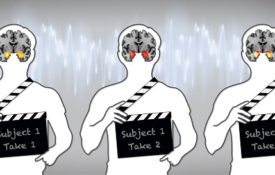-
In Wake Of George Floyd’s Death, Psychologist Reexamines Racial Bias In Policing
The back-to-back deaths of George Floyd and Breonna Taylor have spurred protests across the country. Taylor, a 26-year-old black woman, was shot multiple times by Louisville Metro Police Department officers after they forced their way inside her home. The officer who arrested Floyd, a 46-year-old black man, was videotaped kneeling on Floyd's neck for multiple minutes before Floyd died. The current moment raises serious questions about the future of policing, how bias affects police work, and the mistrust many communities of color feel toward the police. Stanford University’s Dr.
-
Protests Over Killings of Black People Could Erode Racism, Researcher Says
Images and reports of people taking to the streets to protest last month’s killing of George Floyd by Minneapolis police have sparked conversations among Americans on police use of force to control crowds, the morality of looting, and the destruction of property to vent anger and garner attention for a cause. Divergent perceptions of the unrest have roots in unconscious biases and knowledge of historical contexts, says James Jones, a professor emeritus of psychology at the University of Delaware, Newark, who has studied the psychology underlying prejudice and racism.
-
Feeling Upset? Try This Special Writing Technique
After his father was rushed to the hospital with gastrointestinal bleeding, Yanatha Desouvre began to panic. So he did the one thing he knew would calm himself: He wrote. “I’m so scared,” Mr. Desouvre started. “I don’t know what I’ll do if I lose my dad.” In the next few weeks, Mr. Desouvre filled several notebooks, writing about his worry as well as his happy memories—the jokes he’d shared with his dad, the basketball games they’d watched, the time they put up hurricane shutters together, then cooled down with ice cream. Sometimes he cried as he wrote. Often he laughed. “Writing allowed me to face my fear,” says Mr.
-

Scanning the Brain to Predict Behavior, a Daunting ‘Task’ for MRI
New research indicates that task-fMRI lacks the reliability to predict individual behavior or how a person might respond to mental-health therapies. [June 3, 2020]
-
How to Talk to Your Children About Protests and Racism
As cities and social media explode with anger over the killing of yet another black man at the hands of police, worried parents struggle with how to protect their children from seeing the worst of the violence while simultaneously explaining the ravages of racism. It couldn't have come at a worse time. Sheltering at home for months to avoid the deadly coronavirus, many parents stressed by juggling work and child care from home had eased their restrictions on screen time for their children. Now it's even more likely that kids might find the video of George Floyd, an unarmed and handcuffed black man in Minneapolis, gasping for breath as a white police officer pressed a knee into his neck.
-

APS Statement on Confronting Racism and Discrimination
APS statement to the membership on confronting racism and discrimination.

